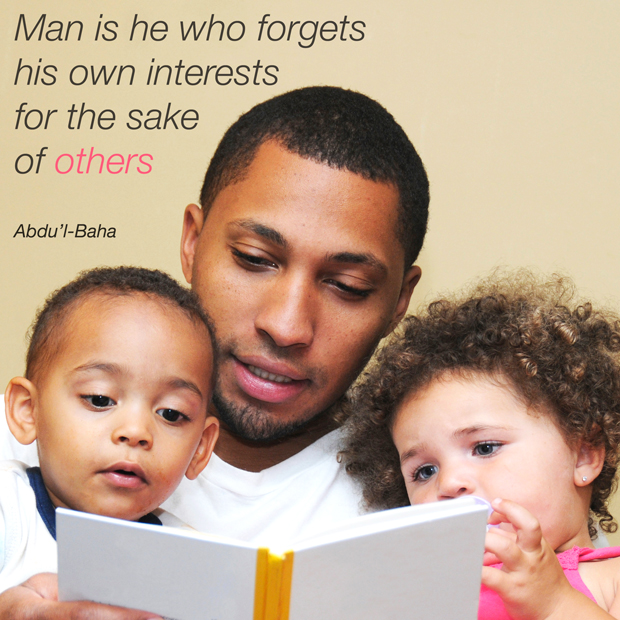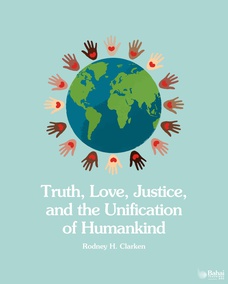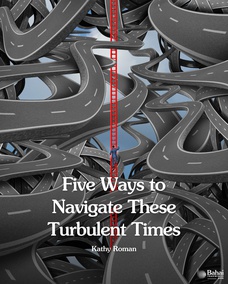The views expressed in our content reflect individual perspectives and do not represent the authoritative views of the Baha'i Faith.
How excellent, how honorable is man if he arises to fulfill his responsibilities; how wretched and contemptible, if he shuts his eyes to the welfare of society and wastes his precious life in pursuing his own selfish interests and personal advantages. – Abdu’l-Baha, The Secret of Divine Civilization, p. 3.
My friend Maggie the altruist has taught me a great deal about what it means to fulfill our responsibilities to humanity–and to be truly human.
 I’ve seen her devote herself to the welfare of others and ignore her own; I’ve noticed the enormous amount of effort she puts into caring for those she doesn’t even know; I’ve watched little children as they hug her tightly, all because of the selfless love she extends to them. She has that rare quality of serving others with no thought of self-interest or advantage. When people feel that level of caring, it affects them profoundly. They can see the purity of intention and motive in Maggie’s heart, and they can’t help but responding with love themselves.
I’ve seen her devote herself to the welfare of others and ignore her own; I’ve noticed the enormous amount of effort she puts into caring for those she doesn’t even know; I’ve watched little children as they hug her tightly, all because of the selfless love she extends to them. She has that rare quality of serving others with no thought of self-interest or advantage. When people feel that level of caring, it affects them profoundly. They can see the purity of intention and motive in Maggie’s heart, and they can’t help but responding with love themselves.
So I’ve come to regard Maggie as a love-engine, a generator of warmth in the world, one of those rare people whose love for others pours out, fills hearts and comes back to her a thousand fold.
That’s the first powerful, life-changing reason to aspire to be an altruist: because altruism creates love in the world, which comes right back to you.
This passage from the Baha’i writings, one of Maggie’s favorites, describes the Baha’i view of altruism:
If man were to care for himself only he would be nothing but an animal for only the animals are thus egoistic. If you bring a thousand sheep to a well to kill nine hundred and ninety-nine the one remaining sheep would go on grazing, not thinking of the others and worrying not at all about the lost, never bothering that its own kind had passed away, or had perished or been killed. To look after one’s self only is therefore an animal propensity. It is the animal propensity to live solitary and alone. It is the animal proclivity to look after one’s own comfort. But man was created to be a man — to be fair, to be just, to be merciful, to be kind to all his species, never to be willing that he himself be well off while others are in misery and distress — this is an attribute of the animal and not of man. Nay, rather, man should be willing to accept hardships for himself in order that others may enjoy wealth; he should enjoy trouble for himself that others may enjoy happiness and well-being. This is the attribute of man. This is becoming of man. Otherwise man is not man — he is less than the animal.
The man who thinks only of himself and is thoughtless of others is undoubtedly inferior to the animal because the animal is not possessed of the reasoning faculty. The animal is excused; but in man there is reason, the faculty of justice, the faculty of mercifulness. Possessing all these faculties he must not leave them unused. He who is so hard-hearted as to think only of his own comfort, such an one will not be called man.
Man is he who forgets his own interests for the sake of others. His own comfort he forfeits for the well-being of all. Nay, rather, his own life must he be willing to forfeit for the life of mankind. Such a man is the honor of the world of humanity. Such a man is the glory of the world of mankind. Such a man is the one who wins eternal bliss. Such a man is near to the threshold of God. Such a man is the very manifestation of eternal happiness….
Consider how the greatest men in the world — whether among prophets or philosophers — all have forfeited their own comfort, have sacrificed their own pleasure for the well-being of humanity. They have sacrificed their own lives for the body politic. They have sacrificed their own wealth for that of the general welfare. They have forfeited their own honor for the honor of mankind. Therefore it becomes evident that this is the highest attainment for the world of humanity. – Abdu’l-Baha, Foundations of World Unity, pp. 42-43.
The Baha’i definition of what it means to be human asks us all to aspire to the high moral station of selflessness.
How does this work? Does every person have the capacity and the inborn ability to become a love-generator in the world? Isn’t selflessness an enormous amount of work? And what about the neurological science behind it—do we know yet whether the human brain contains a natural inclination toward altruism, or is it simply an attribute or a trait we have to work hard to acquire and develop?
In the next essay in this series, we’ll look at the science of altruism.

















Comments
Sign in or create an account
Continue with Googleor